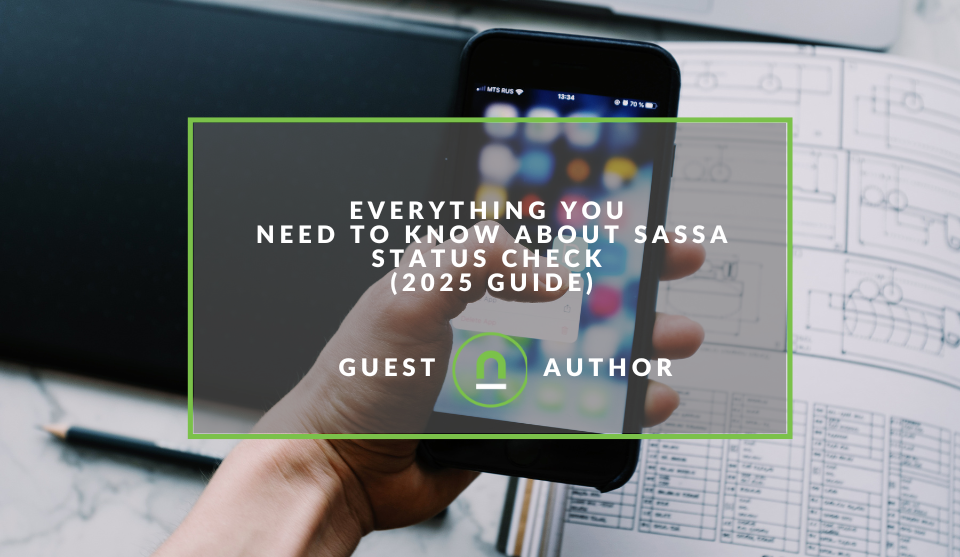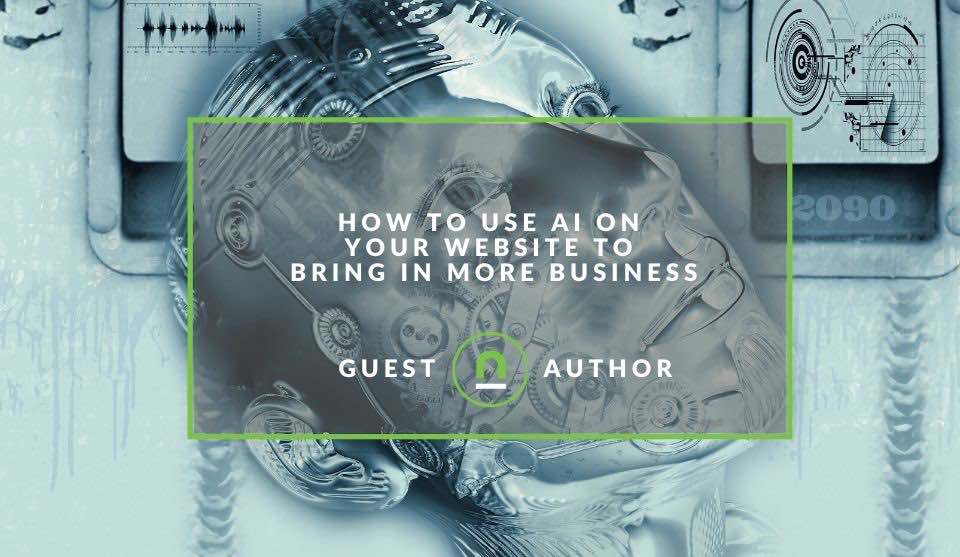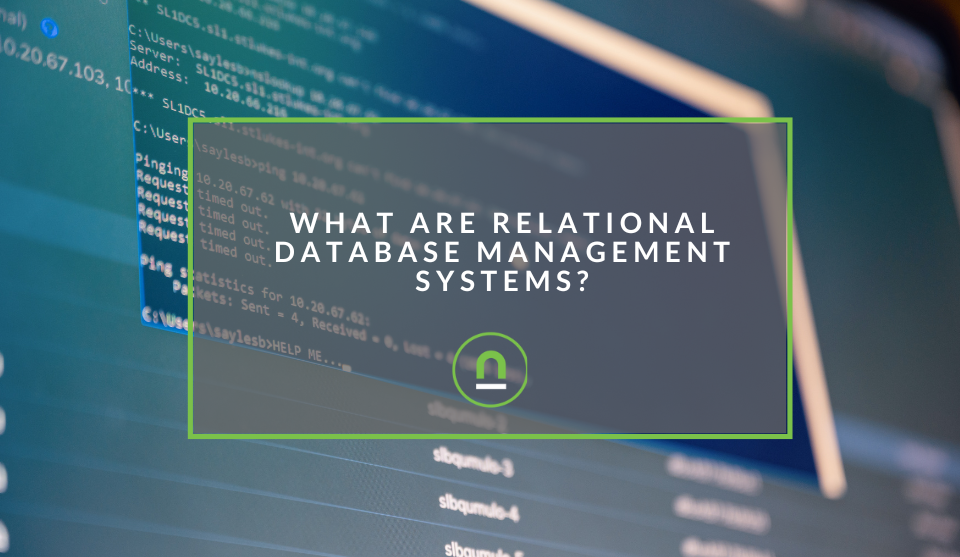Recent posts

Geek Chic
How to Replace A Broken Lenovo Laptop Screen
24 April 2025

Money Talks
Everything You Need to Know About SASSA Status Check
13 April 2025

Mind, Body & Soul
The Genetic Diversity of Cannabis Seeds
12 April 2025

Money Talks
How Small Businesses Can Leverage Blockchain Technology
02 April 2025
Popular posts
Extravaganza
Trending Music Hashtags To Get Your Posts Noticed
24 August 2018
Geek Chic
How To Fix iPhone/iPad Only Charging In Certain Positions
05 July 2020
Extravaganza
Trending Wedding Hashtags To Get Your Posts Noticed
18 September 2018
Money Talks
How To Find Coupons & Vouchers Online In South Africa
28 March 2019
How to Use AI on Your Website to Bring in More Business
13 February 2020 | 0 comments | Posted by Gaurav Belani in Geek Chic
Unless you've been living under a rock on an uninhabited island in the South Pacific, you know artificial intelligence (AI) is all the rage nowadays. As a consumer, AI plays a significant role in your day-to-day life, with or without your knowledge — voice assistants, content recommendations on YouTube or Netflix, and even instant messaging.
Today, AI technology is more accessible than ever before, with many small-to-medium-sized businesses leveraging it on their websites and products. This is one bandwagon you should jump on.
Here are six ways you can use AI on your business website to boost your bottom line:
To provide personalised recommendations
The modern customer not only craves personalized content but expects it too. Imagine how much more effective your website would be if you could offer personalized product recommendations, content, and offers to every potential customer.
Amazon attributes 35% of its revenue to personalized product recommendations, which are regularly updated and optimized to gratify each user.
So, if you're running an eCommerce store or a SaaS website, AI empowers you to serve personalized product recommendations and bespoke content, which can go a long way in boosting conversions.
For conversational marketing
Apart from personalization, AI, with the help of machine learning, also helps build super-effective chatbots — which are almost a necessity today for dangerous business websites, not just a mere nice-to-have feature. Over 53% of customers prefer to use online chat when they need assistance over calling.
Chatbots help your customer service team by being the first responder to visitor's inquiries, which can often be unnecessarily time-consuming for customer support teams. They can help guide visitors to various parts of your website, allowing your team to deal with more significant tasks required to move users further down the sales funnel.
Instead of having visitors fill out a form and await a response from you over email, they can type in their doubts and get on-the-spot answers to commonly asked questions. Such 24/7 availability and the ability of delightful real-time customer service make chatbots a precious AI-based asset.
To incorporate semantic search
A search bar is a helpful feature on any website as it enables visitors to navigate to what they're looking for promptly. These users have a specific purpose in mind, such as finding a piece of content or shopping for a particular product. A successful search experience results in satisfied visitors, which means they are more likely to stick around with your business.
But traditional search, known as lexical search, involves simple character-matching, so the results are limited to literal matches of the search query or, at most, variants of them.
AI crushes this limitation — with semantic search, the search engine can determine the intent and contextual meaning behind the search query, thus enhancing the accuracy of search results, thereby increasing user satisfaction.
To improve site accessibility
One of the most critical elements that constitute a high-performing and trustworthy business website is accessibility. An accessible website accommodates all visitors on all devices regardless of the physical or mental ability of the user.
Now, whether you like it or not, having an accessible website is not optional. The Americans with Disabilities Act (ADA) extends to the digital realm and requires that your website is easily usable by people with disabilities. Your site's visitors, disabled or otherwise, can very well sue you for not having an accessible business website.
But that's beside the point. Accessibility is essential not just to avoid ADA lawsuits but to scale your business and capture new audiences. Nearly one in four adults in the United States live with a disability, and an estimated 26.9 million adult Americans report that they either "have trouble" seeing or unable to see at all.
So, overlooking website accessibility means you are knowingly shunning a big potential audience from doing business with you. While there are many things, you can do yourself to improve your site's accessibility, such as have alt text for visuals, ensure sufficient colour contrast, write descriptive anchor texts, and so on, AI can be a big boon.
For instance, AI can help you provide language translation and captioning for people who are hard-of-hearing. It can also help you automate image recognition and alt text creation for visually-challenged website visitors.
Hence, with a web accessibility tool like accessiBe, business websites can easily make their content accessible to disabled users in minutes and consequently, generate more sales.
For quantitative usability testing
Website usability testing is a process to assess how user-friendly your website is. The tests typically involve real users to determine the ease-of-use of a website.
Usability testing is a crucial step in designing a great user experience. But sometimes the data collected from the test can be insufficient to make the most informed decisions.
Enter AI, which is a powerful asset to have for any testing thanks to its robust data processing capabilities. So, with the help of machine learning algorithms, quantitative usability testing enables you to track and process a vast array of meaningful UX metrics.
This may include information about:
- The device that the visitor is using
- Session time and duration
- Traffic source
- Pages visited
- Categories or products viewed
- Bounce rates
- Total number of website visitors
All these metrics are vital to form a clear understanding of user behaviours and interests, which, in turn, helps bring in more business.
Bonus: For content creation and curation
This information may not be particularly useful for your business (at least for now), but when it comes to content marketing, AI has already made significant advancements. For example, can you believe an algorithm independently wrote the following opening line of a sports story:
"Kenny O'Brien did his best to change the outcome, but the sophomore couldn't will George Washington past Virginia as the Colonials lost 2-0 at Davenport Field on Tuesday."
Publishing giants such as the Associated Press, Fox, and Yahoo have been using AI and machine learning to create content for their websites automatically.
What's more, AI algorithms are also helping in content curation and predictive intelligence — something that gives modern marketers foresight into what kind of content to target and to which customers. And with predictive lead scoring, companies can recognize where users are in their buyer journey and use that data to target specific content formats they are most likely to engage with and encourage a positive response.
Closing thoughts
From enabling instant customer support and providing personalized content to improving accessibility for the disabled, you can use AI in quite a few ways to upgrade your website and land more business.
About the author
Gaurav Belani is a senior SEO and content marketing analyst at The 20 Media, a content marketing agency that specializes in data-driven SEO. He has more than seven years of experience in digital marketing and loves to write about business, AI, ML, data science, and other emerging technologies. In his spare time, he enjoys watching movies and listening to music.
Connect with him on Twitter @belanigaurav.
Tell us your story
Would you like to write for nichemarket just like Gaurav has? Find out how to submit a guest post and when you're ready, you can contact us.
Are you looking to promote your business?
South African retail businesses can create your free business listing on nichemarket. The more information you provide about your business, the easier it will be for your customers to find you online.
Registering with nichemarket is easy; all you will need to do is head over to our sign up form and follow the instructions. If you require a more detailed guide on how to create your profile or your listing, then we highly recommend you check out the following articles.
Recommended reading
If you enjoyed this post and have time to spare why not check out these related posts and dive deeper down the rabbit hole that is artificial intelligence.
You might also like
What Are Relational Database Management Systems?
28 March 2025
Posted by Che Kohler in nichemarket Advice
Learn what relational database management systems are, how they organize data using tables and relationships, and why they remain essential for busin...
Read moreHow Small Businesses Can Leverage Blockchain Technology
02 April 2025
Posted by Nicholas Tay in Money Talks
Unlock growth with blockchain! Discover how small businesses can use this tech for secure transactions, supply chain transparency and innovative solu...
Read more{{comment.sUserName}}
{{comment.iDayLastEdit}} day ago
{{comment.iDayLastEdit}} days ago
 {{blogcategory.sCategoryName}}
{{blogcategory.sCategoryName}}

